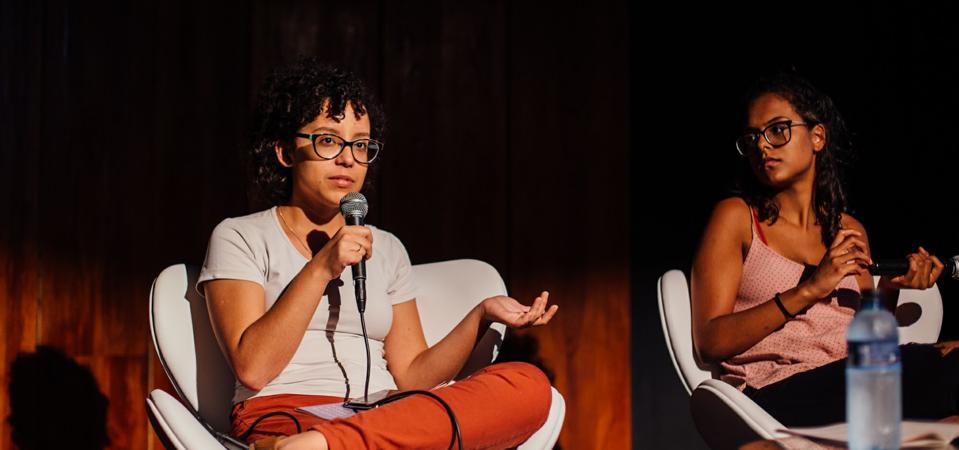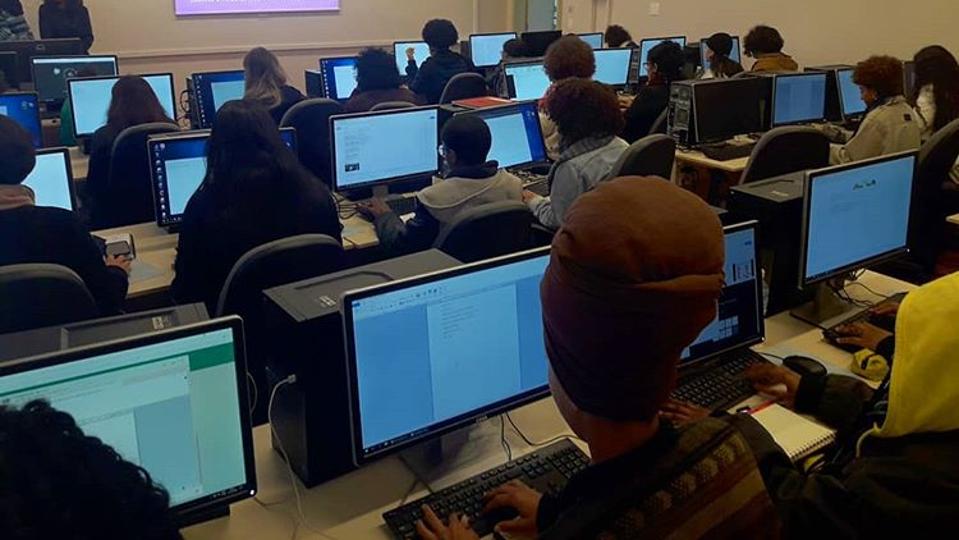
Women Deliver Young Leader Ester Borges (left) and Barbara Paes (right) , speaking on access to … [+]
When the Covid-19 crisis hit, 22-year-old Ester Borges Santos, from Sao Paulo, Brazil didn’t let it impede her mission of giving young black girls the best possible start in a STEM career – she and her colleagues at NGO Minas Programam created a welcoming, inclusive virtual study group on gender, race, and technology.
Borges, a researcher at Brazilian web governance and freedom of speech think-tank InternetLab and a computer teacher and coordinator at Minas Programam, says it is important for companies and society as a whole to invest in the STEM careers of young black girls.
“We seek to deconstruct gender and race stereotypes that influence our relationship with the areas of science, technology and computing,” she said, “We offer programming learning opportunities for girls and women who want to learn to code but don’t know how to get started.”
Borges says back in 2018, she started to work at another NGO with friend and now-colleague Barbara Paes who was already working on the Minas Programam project.
“I had the opportunity to participate in the computer course, which they were organizing, as a student, and simply loved the environment created for all the girls, a non-judgmental environment, where we were encouraged to build knowledge together and all teachers were women,” she said.
Borges says the Minas Programam is important because in Brazilian society, as well as around the world, there is still the idea that the STEM area is reserved for men.
“In a survey conducted by UNESCO in 2015, for example, only 35% of people who study things related to science, technology, mathematics and engineering are women, and in Brazil, where we operate, only 15% of people enrolled in science courses in computing and engineering are women,” she said.
Borges says when women are not producing technology and science, in academic terms, their needs are not taken into account.
“The participation of more women, and specifically black women, in the areas of science, technology, engineering and mathematics directly affects the way in which these women, their needs and their ideas are represented in these areas,” she said, “Therefore, the main problem that we intend to solve is the break with this stereotype, showing the girls that they are also capable of working in areas related to science and technology and this must also be a space for them.
Borges says there are other projects in Brazil that work with women in the programming area such as MariaLab and Elas, but Minas Programam especially focuses on school-age girls.
“The sooner they have contact with the understanding that they can be programmers/scientists more this changes their personal trajectories,” she said, “We always seek to work with racialized women in the peripheral areas of the city of São Paulo, as they are people most lacking in opportunities.”
Borges is a member of 2020 cohort of the Women Deliver Young Leaders Program, who are 300 young changemakers, including 49 people from 20 countries in Latin America and the Caribbean. Since 2010, Women Deliver, an NGO championing gender equality and the health and rights of girls and women has reached 1,000 young advocates from 148 countries.

Brazilian girls in a computer logic class run by Minas Programam.
Borges says preparing the next generation of women in STEM in Brazil is particularly important given that the government there has been slashing science funding in recent years: one of the country’s main federal research funding agencies (CAPES, for its Portuguese acronym) has already announced that 11 800 scholarships will not be renewed, a 12% reduction.
“To continue their studies many of these young women and girls would need scholarships,” she said, “The lack of scholarships to research in public universities is another barrier for women and girls in STEM in Brazil.”
Elsewhere in Brazil, young women and girls are already putting their STEM skills to the test.
A team of Brazilian girls have turned a school project into an mobile app aimed at confronting the world’s second leading cause of death among 15-29 year-olds: suicide.
Anna Ferronato, Jhuly Carvalho, Ana Giacomeli, Clara Pithon da Silva, and Emanuela Maraskin developed Safe Tears, a suicide prevention app.
The girls are all alumnae of Technovation Girls, a 12-week global entrepreneurship program for girls ages 10-18 in which the participants identify major real-world problems and then develop mobile apps to solve them.

No Comments
Leave a comment Cancel